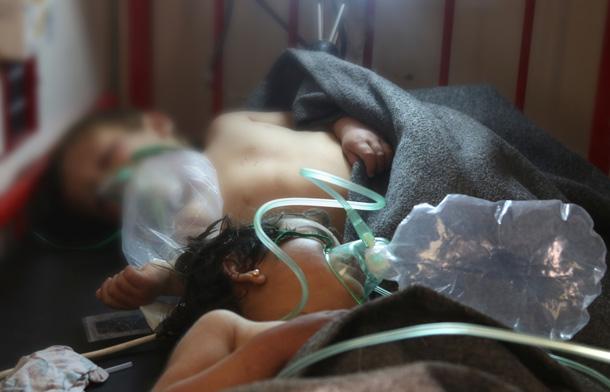- 7 Apr 2017
- [International Secretariat]
- Region: SYRIAN ARAB REPUBLIC
- Topic:

© MOHAMED AL-BAKOUR/AFP/Getty Images
Evidence gathered is suggesting a nerve agent was used in an air-launched chemical attack which killed more than 70 and injured hundreds of civilians in Khan Sheikhoun in Syria’s northern province of Idleb, Amnesty International revealed as the UN Security Council meets for an emergency meeting in New York this morning.
The organization is urging the Security Council to immediately adopt a resolution that will enforce the prohibition of chemical weapons attacks and facilitate bringing the perpetrators of these crimes to justice.
“Security Council members, and in particular Russia and China, have displayed callous disregard for human life in Syria by repeatedly failing to pass resolutions that would allow for punitive measures to be taken against those committing war crimes and other serious violations in Syria,” said Anna Neistat, Senior Director of Research at Amnesty International.
“The Security Council must immediately vote to investigate this attack and help bring those responsible to justice. Failure to do so would be catastrophic, risking further emboldening governments and armed groups in Syria.”
Many of the victims of the attack, which occurred around 6:30a.m. local time on Tuesday 4 April, appear to have been poisoned as they slept in their beds. Chemical weapons experts working with Amnesty International have confirmed that victims are very likely to have been exposed to a nerve agent, or an organophosphorus compound, such as sarin.
Video evidence
Amnesty International was also able to authenticate more than 25 pieces of video footage shot in the aftermath of the chemical weapons attack. Some videos are of sufficient quality for experts to observe victims with pinpoint pupils, described as a classic symptom of nerve gas poisoning. There are reports of medical staff suffering from secondary exposure, which would also be consistent with the use of a nerve agent. In some videos, victims displayed no twitching or jerky movements which experts agree suggest cases of extreme poisoning. In others, including videos of children, the patients are trembling.
One piece of footage shows nine children lying lifeless in the back of a pick-up truck. The children, little girls and boys, are naked or partially dressed; they appear to have died in their beds. No signs of trauma are visible on their corpses, which is consistent with chemical poisoning.
“This is the deadliest chemical attack in Syria since the United Nations Security Council passed resolution 2118 in September 2013 for the elimination of Syria’schemical weapons,” said Anna Neistat.
“The Organisation for the Prohibition of Chemical Weapons and the UN have jointly confirmed several chemical weapon attacks since then, by government and non-government forces alike. It is appalling that nobody has been brought to justice.”
Interviews with medical workers in Idleb
Amnesty International interviewed a nurse, who was working at the Al Rahma hospital. “The sound of the explosion was not what we are used to – my colleagues and I thought that this one hadn't exploded, because of the thump sound it made, not an explosion sound. A few minutes later, around 6:35a.m., the first victims were brought in – and then the flow just kept going until around 9a.m.”
The nurse also described unfamiliar symptoms:
“The smell reached us here in the centre; it smelled like rotten food. We've received victims of chlorine attacks before – this was completely different. Victims had vomit from the nose and mouth, a dark yellow colour, sometimes turning to brown.”
“The use of chemical weapons is strictly prohibited under international humanitarian law and constitutes a war crime. The international community must show outrage and take all possible measures to protect the Syrian people and the people of the world from such horrific acts,” said Anna Neistat.
05 April 2017
AMNESTY INTERNATIONAL PRESS RELEASE
Related Actions
- 10 Feb 2024
SYRIAN KURDISH STUDENT DISAPPEARED IN SYRIA - 25 Aug 2016
10-YEAR-OLD GIRL IN NEED OF SURGERY EVACUATED [Suspended]
Related Newses
- 17 Oct 2019 [International Secretariat]
SYRIAN ARAB REPUBLIC: Civilians at risk as Turkish military offensive looms - 26 Apr 2019 [International Secretariat]
SYRIAN ARAB REPUBLIC: Unprecedented investigation reveals US-led Coalition killed more than 1,600 civilians in Raqqa ‘death trap’ - 19 Apr 2018 [International Secretariat]
SYRIAN ARAB REPUBLIC: Block on Douma chemical attack investigation must be lifted immediately - 28 Feb 2018 [International Secretariat]
SYRIAN ARAB REPUBLIC: Relentless bombing of civilians in Eastern Ghouta amounts to war crimes - 15 Feb 2018 [International Secretariat]
SYRIAN ARAB REPUBLIC: Witness testimony reveals details of illegal chemical attack on Saraqeb




